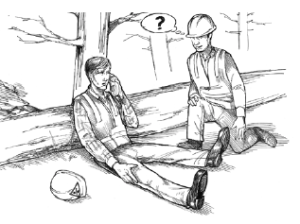
Illustration from WorkSafeBC Hazard Alert 99-11: Ensure transportation of injured workers
The First Aid Training Providers list is a valuable resource for BC workers and employers who need to find service in their communities. It’s one of the most frequently visited pages on the WorkSafeBC website.
First aid requirements for employers in BC are based on number of workers, their proximity to medical aid, and industry hazard rating.
Read more on the above in WorkSafeBC’s Introduction to First Aid.
How to choose?
WorkSafeBC published its first list of trainers online 10 years ago. Now it’s updated every quarter or as needed, says Angélique Prince, senior certification officer with WorkSafeBC.
She said – when I asked – that it was only once a week her office received calls from employers looking for first aid trainers. I thought they might get a lot of phone calls, but they don’t. Most employers know the list is online.
But about once a week they get a call from someone who says “‘I live in the Lower Mainland and there are 50 places on the list. How am I supposed to pick?'” Angélique said.
She and her staff refer them to How to Choose an Occupational Health and Safety
Training Provider.
A more frequent question, Angélique said, is from employers wanting information on first aid requirements for their workplaces.
This question is answered in WorkSafeBC’s First Aid Guideline that sets out “a step-by-step method for employers to follow when conducting an assessment of the workplace to determine an adequate and appropriate level of first aid coverage.”
For information on out-of-province first aid certification, requirements for paramedics, and certificate renewals, see WorkSafeBC’s requirements for First Aid Attendants.
The OFA Job Checklist guides attendants through a review of the Regulation, site-specific hazards, personnel, evacuation, exposure control, and all they need to know in case of emergency.
Ongoing training keeps skills fresh
Angélique stressed the importance of ongoing training to “keep skills fresh.”
Certificates are good for three years, but workers still benefit from drills and refresher training.
“The employer has a duty to ensure their competency as an attendant,” Angélique said.
In my view, it takes a special person to be a first aid attendant – someone who can stay calm and do what’s needed for an injured person. I have great respect for people who can do it.


